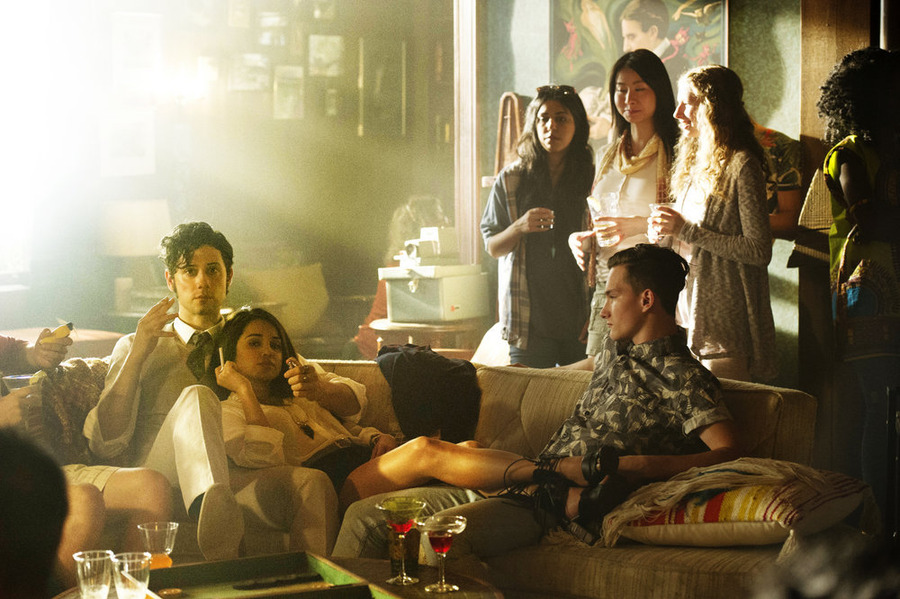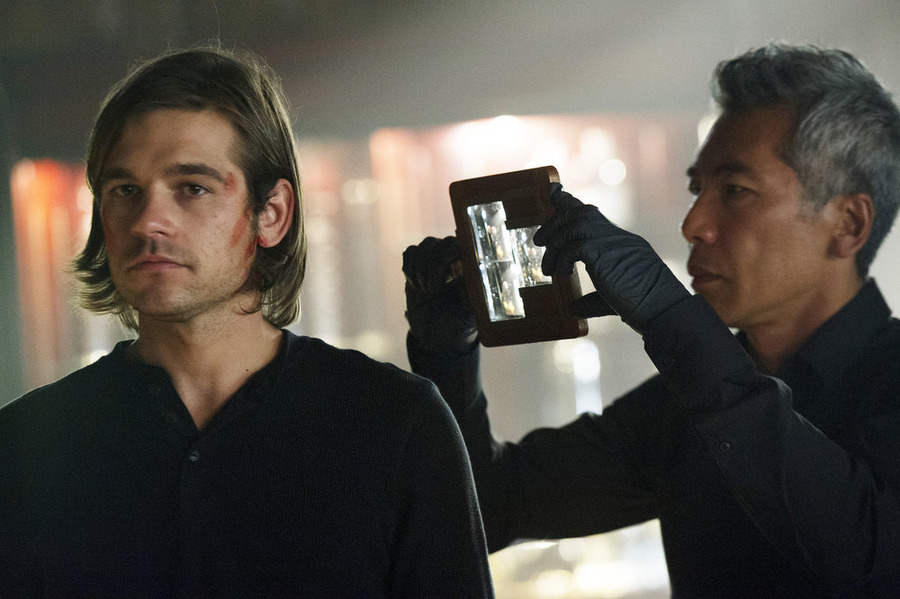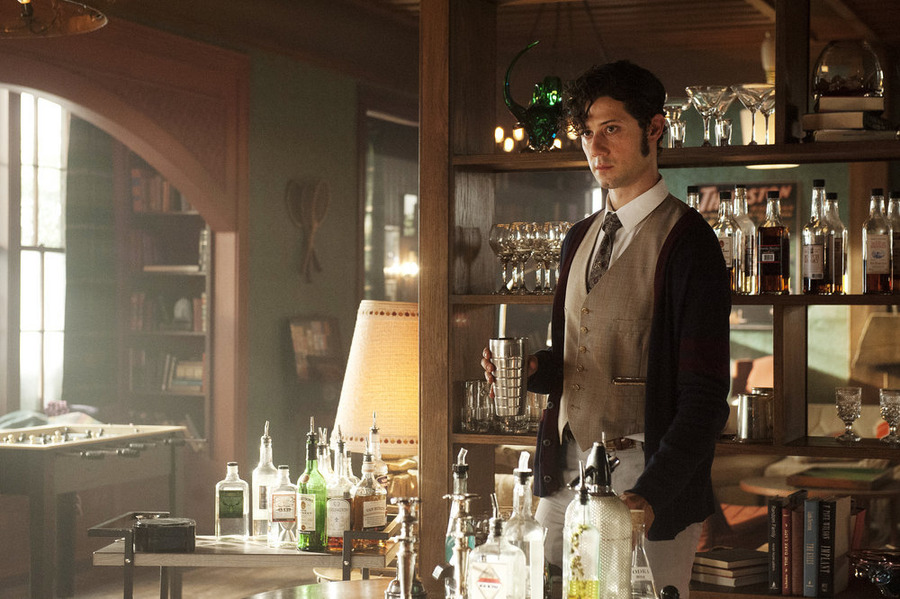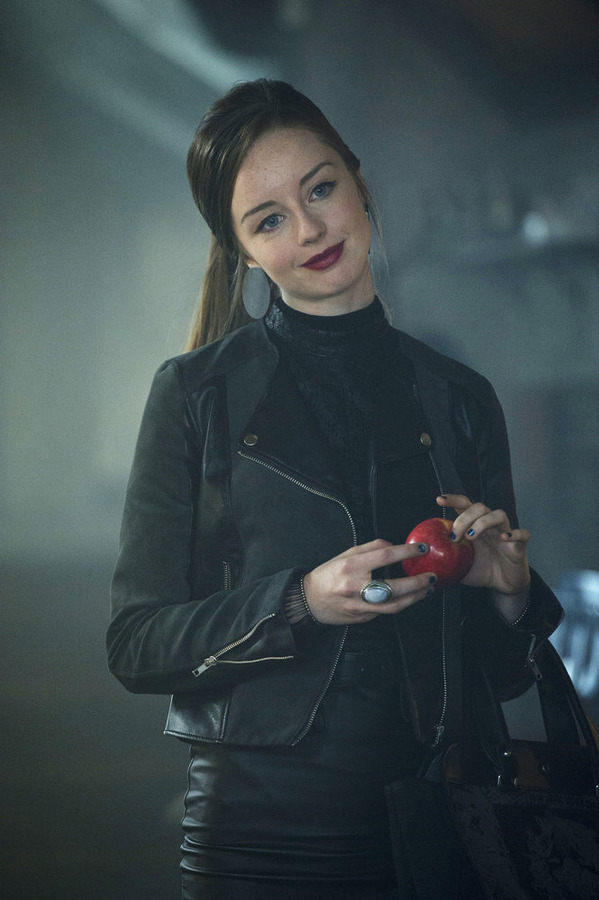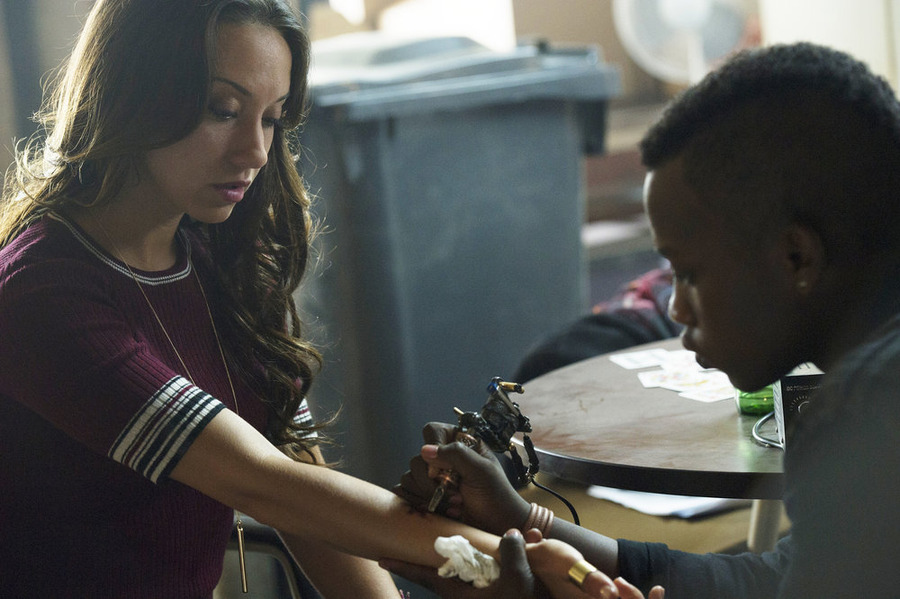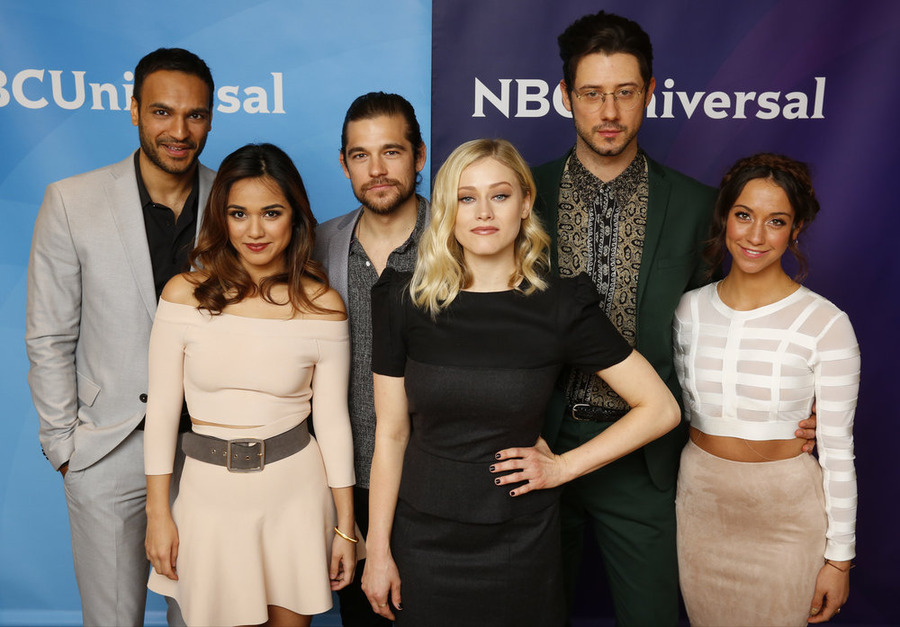
By: Courtney V
OHSOGRAY recently attended a press call for The Magicians with star Jason Ralph (“Quentin”) and executive producer Sera Gamble. They talked about some of the challenges in bringing Lev Grossman’s magical bestseller to the small screen and what book fans can expect to see.
The Magicians premieres January 25th at 9/8c on Syfy.
Jason, did you read the book before you auditioned, or after you auditioned, at some point?
Jason Ralph: I read them during the audition process and before it ended, I had become like a very quick and very rabid fan.
Can you both talk about how the story is going to kind of be similar and yet differ from the book series story-wise?
Sera Gamble: I think the first most obvious difference that the fans will notice when they tune in is that we’ve aged the characters up a little bit. Quentin is 17 when you meet him in the book, and he is more like 22 in our television show. They are headed into graduate school. We did that for a number of creative and practical reasons. When we realized that this is a choice we might have to make, John McNamara, my writing partner and I, took it very seriously. We didn’t want to change anything from the books that we didn’t have to, so we sat down with Lev Grossman, the author, and hashed out what that change would mean and we all realized we really loved it. So, I think that’s been for the best. Throughout the season, we’ll be hitting a lot of the greatest hits of book one. We sometimes come at them a little bit differently. We say we have the same general roadmap but we sometimes take slightly different roads than Lev did in the books.
Could you speak a bit about the women characters?
Sera Gamble: We inherited these great female characters from Lev and one of the great things about making this as a TV show is we get to deep dive into more of the characters. I think when you read the books, you first and foremost are kind of inside the experience of Quentin Coldwater. But because we spend many, many hours in this world, we get to spend a lot of time in Julia’s point of view and a lot of time in Alice’s point of view. It’s not something I think about when I’m writing. It’s just sort of — we break the story in the room and we do what makes instinctual sense to us. I do have to say that in the editing room, there are times when there are scenes that are three female characters talking about these important things that are happening in their lives and all the conflict that’s going on. As a viewer in that moment, I get a little charge. I get excited to see all of these interesting three-dimensional female characters kind of figuring their shit out together.
Are there any stories that either of you read growing up that grabbed you the way that this series has grabbed so many fans?
Jason Ralph: I grew up with the Harry Potter series and had had a very similar experience with that. But I say strangely enough, like the strongest experience I’ve had to a story is this made-up one– called Fillory. I don’t know what it is. But the time when I, as Quentin Coldwater, get to talk about Fillory, like my body, all the nerves in my body just spark and my brain goes crazy and I can’t think and I can’t make words because I’m so in love this like make-believe world. And it’s very strange and I can’t explain it.
Sera Gamble: I loved the Chronicles of Narnia. When I was a little kid, I read those many, many times. I also gravitated strongly towards just classic fairy tales. I wore holes in my books as Grimms’ Fairy Tales and Hans Christian Andersen and I remember being a little kid and trying to write my own version of those classic fairy tales. So, I was kind of born ready to do the show.
Can you talk about the show’s magic tricks and effects?
Sera Gamble: When we were doing the pilot, we came across this –essentially, it’s a form of dance, called finger tutting, which is an offshoot of tutting which is a little corner of the world of hip-hop because we were searching for a way to kind of codify the language of magic which is very specific and arduous and difficult and intensive, and it’s done with the fingers, primarily, in Lev’s books. So, it was actually John McNamara’s assistant. He recommended we go on YouTube and just search the term, Finger Tutting. And as soon as we saw that, it felt really fresh and good to us and we hired a choreographer to work with the actors.
Jason Ralph: The experience, like learning these tutts, I found like very similar to the experience of learning the magic that I had to learn for the show, like the practical magic, the card tricks and the coin tricks and things. And that is – and that is like incredibly difficult. It requires like such a mind for detail and it takes like too many hours to practice and to get right. There is something about learning how to learn those kinds of things which was very useful in getting into the head of these kinds of people and into Quentin. There’s people who can like dive into material for hours and hours and hours and work on one tiny little specific thing without getting bored of it. Learning how to do that was like very useful.
What about the spells and “magical” elements?
Sera Gamble: As for the Google-ability of the other spell elements, I would be curious to hear from an actual practicing which if any we’re getting anything right. We might. I don’t know. I do know that we Google the craziest shit all day long in the writer’s room and I had been reading about this sort of new age solution to the radiation that comes off of computers, if that in fact exists, which I’m not sure if it does. I don’t know. But I was reading about this kind of crystal grid that someone had set up to kind of minimize the bad stuff that comes off your computer and that turned into a mind meld with our production designer, Rachel O’Toole, about what they would have to do at Brakebills in order to use conventional electronics. Because essentially, Brakebills University is a place where people have been doing spell upon spell upon spell for many generations. And so, the air is very thick with enchantments and a lot of your “so to say” muggle hardware malfunctions at Brakebills. They don’t use cellphones very much, and they don’t use computers very much because they’re just not reliable in that atmosphere. So, there are little rooms that the students have kind of jury-rigged in order to do things like play video games and use their cellphones and look things up on Google. And it’s one of my favorite sets, though it’s quite tiny. Alice and Quentin sneak into this little supply closet that students have jury-rigged with a bunch of crystals to be able to use computers in there. The visual, it’s really beautiful and it came from this random Google in the writer’s room.
Jason, did you have to learn sleight of hand?
Jason Ralph: Yes. All of the sleight of hand magic you see is totally 100 percent real. I have been practicing that with Mike Cahill. I sent him the video of me doing it and he was like, “Oh, man. You just saved us like $70,000.” I was like, “All right. You owe me like a really nice bottle of wine.” Which I’ve yet to get, actually.
We see Julia’s story parallel to Quentin as opposed to kind of catching up with her halfway through the novel. How does that impact the story?
Sera Gamble: It definitely makes the story of season one a bit more of a two-hander. You’re with Quentin and you’re very much – he’s very much our way into Brakebills and we’re deep into his story. But at the same time, we’re seeing a very parallel story unfold for Julia. She’s the one who didn’t get into Brakebills, she has to either give up magic or figure out some way to get it on her own and it turns out to be a much more dangerous and unreliable way of getting magic. It also, I think, really heightens the relationship between Quentin and Julia. If you saw the pilot, they’re life-long best friends and there’s a lot of layers to that friendship. It became really clear as we were writing these two stories at the same time that she doesn’t just sort of fade away from his life in that, “oh, well. I’ve outgrown my friend,” kind of way. There’s an active hurt and an active antagonism that grows from the way each of them handled the fact that one of them got into the school and one of them didn’t.
Jason, did you and the other cast do anything special to bond together as a group for the show?
Jason Ralph: Yes. Well, I mean, we got to shoot the pilot in New Orleans, like a really amazing city and there’s a lot to do at night in New Orleans. So like we got to go see like a bunch of music and drink a lot and as a cast, a lot of us went to the Magic Castle in L.A. and got to see the magic firsthand which was really wonderful.
Sera, were there any special challenges for you in putting the show together?
Sera Gamble: Well, we’re trying to do justice to the spirit of the books. That’s probably the thing that wakes us up in cold sweat the most. But the good news is that we have this amazing cast. We, across the board, lucked out. That’s the first most important piece of the puzzle I think for a TV show. Every challenge is the challenge of making the show on the schedule and the budget of a television program. But I’m not being facetious when I say this. I really believe that those constraints also make the work better in that we have to pick our moments really carefully. […] We don’t have any room to waste time or money on the show. We put every line and every page through boot camp before we go shoot it. And hopefully that makes the end product better and more exciting.
Can you talk about the process of bringing Quentin to life?
Sera Gamble: Once we wrapped our head around it, actually, it wasn’t hard at all. The Quentin story is a coming of age story. It’s a story about someone who is young and walking into the problems and the wonders and the challenges of the adult world and becoming the man that he is going to be. And that story is perfect to tell about someone in their early 20s. I think that kind of matches up with where we are as a culture right now. I think we do a lot of our maturing in our early 20s. And I don’t know. I think it ended up working out really organically.
Jason Ralph: I had a very similar organic experience with it — of getting to read the books and falling in love. Then filtering through that, that through me then through the lines of the show, I don’t know. There’s — something just sort of like spewed out that is my Quentin Coldwater. It came very naturally, and it was very fun to do. At the same time, from an academic perspective of really going back to the books as much as possible and re-reading the sections from the books that we happen to be shooting that day to bring the spirit of him through me. Or at least the spirit of him that I experienced, like through the filter of me. Yes.
Jason, what kind of response have you received from fans so far?
Jason Ralph: It’s been like so wonderfully supportive and people seem really excited about the project and about our interpretation of the characters and of the show. Especially at Comic-Con, we had such a wonderful time, a lot of people came. They were a little skeptical as they should be. I think after what they saw from the show and from us on the panel, came away really excited and very supportive. Like I had like a post-panel discussion in the men’s room after the panel. Like one-on-one interactions with all the fans. I tell you what, it was the best. I’m so glad that I happened to have to go into that bathroom because they had such great questions and were very honest about being skeptical at first and that they’re like – but like we change their minds or left them with some confidence which is was really cool.
What does Lev Grossman think of the show?
Sera Gamble: Lev is an active part of the making of the show. He reads the scripts before our bosses do and he sees the cuts before our bosses do. So, we’re very transparent with him about the process and we ask for his advice at times and he sends us really thoughtful interesting good notes. No one knows the DNA of the world better than he does. He lived in it for 10 years. So, he has a lot of really good smart things to say about the magic so, he’s been really helpful in making this TV show.
Has he agreed with all of the story decisions?
Sera Gamble: Well, he certainly hasn’t agreed with 100 percent of everything we ever pitched, so he’s always very gracious about it. But I don’t – my perception of it is that it doesn’t come from the feeling that we’re diverging from the books. He really does take the ideas of the show on their own merits and understands that we’re making a version of the story and that we’re making kind of an iteration and adaptation and that it will be the same in some ways and it will by necessity and also because it’s sort of an organic growing thing, it will be different in certain ways. He certainly doesn’t stress out about that to us. He really takes each script and each story as it comes and talks about what makes sense to him and what doesn’t or what appeals to him emotionally and as a fan of fantasy and what he’s having trouble wrapping his head around. We just kind of have a writer-to-writer conversation about it.
There is a Harry Potter quality to the story. Can you talk about what makes it distinct?
Sera Gamble: When Lev wrote the book – and by the way, you don’t have to have read the books by any means to — enjoy the show. I think the books can be enjoyed on their own and the show can be enjoyed on its own or you can do both. But Lev, the idea for The Magicians came because he was waiting for that Harry Potter book that was taking too fucking long. And he kind of did this thought exercise that was instantly appealing to me when I read the books that I think it’s something that a lot of people do, which is apply the tropes and the stories of a fantasy story to your own life. In the case of Harry Potter, it’s like, “OK. Here are these kids who have magic and they have the problems of heroic children.” Then the question is, what would this be like in actual current day New York City among older people who have the problems of everyday adult life? What does magic mean in that kind of circumstance. That was one the core ideas that The Magicians was borne out of. So, the inspiration of Harry Potter is – was a knowing one and was one that I think those of us who really love Harry Potter enjoy because it’s kind of an adult story. It’s a story for us now. It doesn’t have the same kind of black and white ideas of good, evil, destiny, heroism. It kind of takes that through the blender of adult life when everything gets much, much more complicated and sort of less easy to chart. And that I think is also maybe the answer to the question of how it differs from those stories, I think. I think the emotional life of the story is really complicated and the DNA is much more adult.
Can you discuss the relationship between Julia and Quentin?
Jason Ralph: I mean, I feel like their lives are sort of like destined to keep running into each other – what they’re doing. What did you ask?
Sera Gamble: I can give you kind of a minorly spoilery answer that kind of goes to what we do a lot on the show. Which is yes, there’s confrontation coming between the two of them. I mean, after what you see in the pilot, it’s clear they have some issues to hash out. The confront – magic is the subject. The confrontation is totally human. It’s – there’s a really – there’s a scene that I really enjoy between the two of them in an early episode in the season that is – that would not be out of place on a show with no magic. And there’s a ton of magic in that episode and they do a ton of magic in that episode. And magic is the reason that they’re having a conversation that they’re having ostensibly, but they’re having the talk that two former best friends need to have because both of them have tripped up and they have damaged the relationship. So, we really try to make sure that the – that the character journeys on the show would make just as much sense if you tuned in a show in a world where magic weren’t real.
Jason, what about Quentin Coldwater attracts you to the role and you see parts of yourself in him?
Jason Ralph: I like that he’s not a classic hero and never will be. He’s not the chosen one but he is sort of thrust down this — the throat of this hero’s journey and is kind of coming to terms with that and coming to terms with that fact that something that he’s always wanted and that – sort of ill-equipped for it. I like that he’s like not – not always likeable. There are things about him that are despicable and like those are fun things to get to play. But there’s something about him that keeps you rooting for him because I think it’s the human – I think that’s what makes it relatable, that none of us are like perfect human beings. And I think the show really explores the flaws in humanity and in these characters. And that we’re forced to embrace them in order to move forward.
